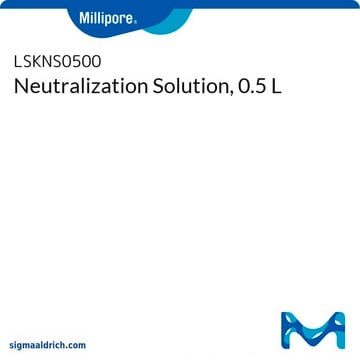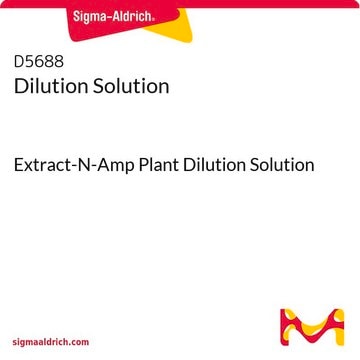XNAT2R
Extract-N-Amp™ Tissue PCR Kit
sufficient for 1000 extractions, sufficient for 1000 amplifications
Synonym(s):
Tissue direct PCR kit
About This Item
Recommended Products
usage
sufficient for 1000 amplifications
sufficient for 1000 extractions
sufficient for 1000 reactions
feature
dNTPs included
hotstart
technique(s)
PCR: suitable
color
colorless
shipped in
wet ice
storage temp.
−20°C
Looking for similar products? Visit Product Comparison Guide
General description
Application
Features and Benefits
- Fast – rapid extraction of genomic DNA for PCR in 15 minutes
- Convenient – no long enzymatic digestions or column purification required
- Practical – perfect for quick genomic DNA isolation for genotyping
- Flexible – protocols available for mouse-tails, hair, animal tissue, saliva, and buccal swabs
- Specific – Hot start antibody for highly specific PCR amplification of genomic DNA
- Extract stable at 4 oC for at least 6 months
Components
Principle
Other Notes
This kit includes a clear solution of PCR readymix. To order the REDExtract-N-Amp Tissue PCR Kits with the inert tracking and loading dye in the PCR readymix, please order XNAT-1000RXN"
Legal Information
Antibody licensed for in vitro research use under U.S. Patent No. 5,338,671 and 5,587,287, and corresponding patents in other countries.
Use of this product is covered by one or more of the following US patents and corresponding patent claims outside the US: 5,789,224, 5,618,711, 6,127,155 and claims outside the US corresponding to expired US Patent No. 5,079,352. The purchase of this product includes a limited, non-transferable immunity from suit under the foregoing patent claims for using only this amount of product for the purchaser′s own internal research. No right under any other patent claim, no right to perform any patented method, and no right to perform commercial services of any kind, including without limitation reporting the results of purchaser′s activities for a fee or other commercial consideration, is conveyed expressly, by implication, or by estoppel. This product is for research use only. Diagnostic uses under Roche patents require a separate license from Roche. Further information on purchasing licenses may be obtained by contacting the Director of Licensing, Applied Biosystems, 850 Lincoln Centre Drive, Foster City, California 94404, USA.
related product
Signal Word
Danger
Hazard Statements
Precautionary Statements
Hazard Classifications
Aquatic Chronic 2 - Eye Irrit. 2 - Resp. Sens. 1 - Skin Irrit. 2 - Skin Sens. 1 - STOT SE 3
Target Organs
Respiratory system
Storage Class Code
10 - Combustible liquids
Flash Point(F)
Not applicable
Flash Point(C)
Not applicable
Certificates of Analysis (COA)
Search for Certificates of Analysis (COA) by entering the products Lot/Batch Number. Lot and Batch Numbers can be found on a product’s label following the words ‘Lot’ or ‘Batch’.
Already Own This Product?
Find documentation for the products that you have recently purchased in the Document Library.
Customers Also Viewed
Our team of scientists has experience in all areas of research including Life Science, Material Science, Chemical Synthesis, Chromatography, Analytical and many others.
Contact Technical Service












